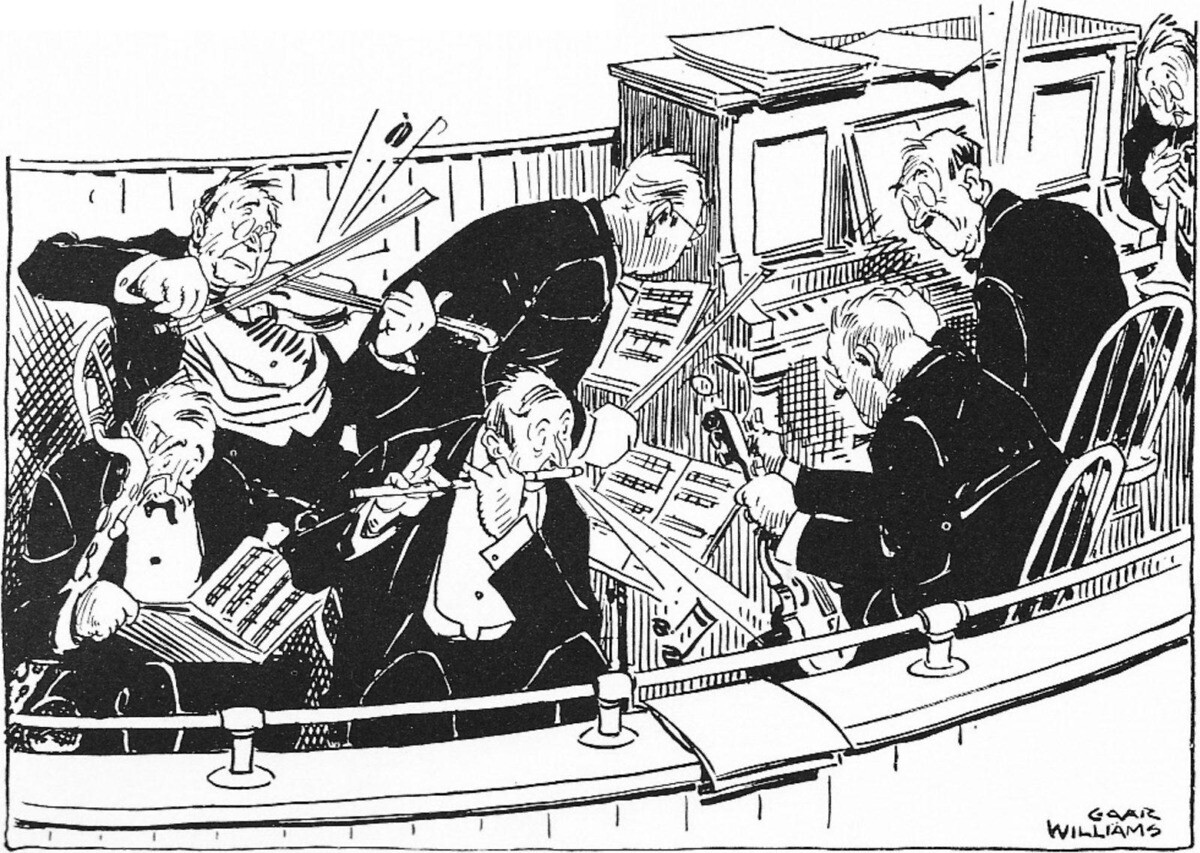There’s a magic moment in jazz…a small window of time…between the musicians taking the stage and counting off the first tune.
It may not seem like a long time to the untrained eye, but a lot can happen in these magic moments. Just like David Attenborough in a nature documentary—if you stay perfectly still and observe musicians in their habitat without disturbance—you may even catch some of these magical and revealing moments yourself. Here are some things to watch out for:
Tuning up. Jazz musicians like to pretend to tune up, because one time they saw a classical orchestra do it. So, generally the Piano Player will provide a B-flat note (which is dubious enough given the condition of most of the pianos in jazz bars), and the musicians will blow/play a note and then fiddle with their instruments for a minute or two: pulling out tuning slides, mouthpieces, strings etc., until they end up getting exactly the same note that they started with. But this redundant ritual provides the audience with the impression of them being ‘serious’ musicians. (Don’t spoil it for them and tell them I told you.)
The Guitar Player. If there is any written music on the gig, the guitarist will look over the music with the intense concentration of someone trying to decipher ancient hieroglyphs. This is a last minute attempt to try and prove to the band that they can actually read music: a ruse which will of course be totally quashed by the end of the first tune.
Clarinet Players will be maniacally pulling out reeds of a box, playing one note, cursing—then throwing the reed to the ground. They would theoretically repeat this process indefinitely, or until someone counts off the first tune. (N.B.: the clarinet player will sound the same no matter the reed chosen. But this ritual is important to set the groundwork for making excuses for squeaking throughout the gig).
The Trumpet Player will be buzzing his lips. (Think of it as a Bronx Cheer, but less musical.) The interesting thing is that he will do this from the moment he leaves the house, till the first beat of the song. If you’re ever stuck in traffic next to a trumpet player you can witness this process in mid stream. Whether this actually helps them play better has never been proven. But the rest of the band don’t mind—because otherwise he’d spend the time complaining about his chops.
If the gig is a regular weekly engagement, the Trombone Player will be looking for his trombone. He left it there last week.
If there’s a Vocalist on the gig, they will be spending all moments up till the count off taking selfies with their latest outfit and posting to social media with hashtags, like #livingthedream or #myofficefortheday.
(For our older readers out there, “social media” is a method young people use to socially interact, to avoid actually having to socially interact with anyone in the same room.) This social media self-promotion is of the highest priority: as it is realized when it’s time for the vocalist to sing a tune—at which point they will take the stage and spend awkward moments trying to figure out which song they want to sing and then try and find the key.
Bass Players, if totally acoustic, will be blankly staring into space, worn out from the previous three gigs they played that day. If it’s a loud gig and they need amplification, they will be trying to figure out the reason their pick up mic is crackling. This has happened universally on every gig for the last 10 years, but each time the malfunction is met with complete surprise and a comment like “this has never happened before.”
The Drummer is always running late because they couldn’t find parking. They will then bump as many people in the bar as possible while carrying drums to the stage. Please note none of the band will attempt to help, being far too busy (see above). The drummer will then attempt to fix a squeaky bass drum pedal which has been squeaking since 1974.
Once the last string, screw, reed, nut and bolt is in place, the bandleader then chooses the first song, and gets ready to count it off. The band uses this opportunity to take one last sip of beer.
“1….2…..1-2-3-4…”
And…well…you know the rest.
Reedman extraordinaire Adrian Cunningham is the leader of Professor Cunningham and his Old School Jazz Band, based in New York City. Adrian Cunningham was voted in a 2017 Hot House Jazz Magazine readers’ poll the Best Alto Sax Player in New York. His most recent album is Duologue, issued on the Arbors Jazz label. Visit him on the world wide web: www.adriancunningham.com.






















